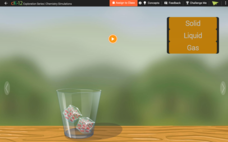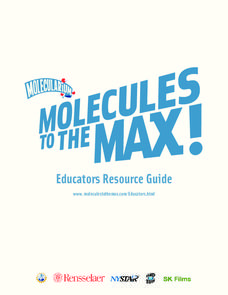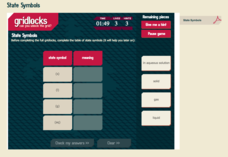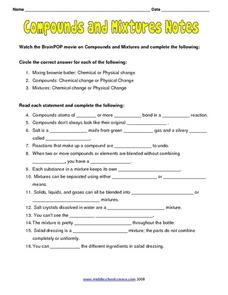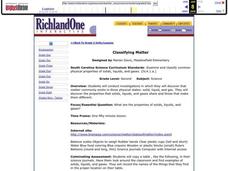American Chemical Society
Float and Sink
We're not talking about the kitchen sink. Learners explore what types of objects sink and float in water in an inquiry-based instructional activity. With experimentation, they find similarities between materials that float and those that...
PBS
The 3 Phases | Phases of Matter | UNC-TV Science
Explore the states of matter without the mess or expensive equipment in a compact, informative activity. Scientists watch as the narrator explains the three states of matter using a glass of ice and soda in an animated video that...
PBS
Phase Changes | Phases of Matter | UNC-TV Science
Take an energetic ride through the phase changes of a water molecule in a compact activity. Young scientists learn about the phases of matter and discover the role of thermal energy in governing phase changes while watching a short...
CK-12 Foundation
It's Just a Phase
Explore the phases of water as temperature rises. Pupils consider the idea that temperature remains constant during each phase change. An interactive exercise allows your young scientists to observe the temperature and molecular motion...
CK-12 Foundation
What's the Matter?
What makes ice, water, and steam different? Their molecular arrangements are the same, but their movements are different. Individuals make this conclusion by completing the simulation activity.
Concord Consortium
Specific Heat and Latent Heat in Condensation
There's more to melting than meets the eye! Junior physical chemists investigate the differences between specific and latent heats as a substance undergoes a phase change. Users remove heat from the system and observe changes in kinetic...
Rensselaer Polytechnic Institute
Molecules to the Max!—Educators Resource Guide
From molecules to nanotubes, an engaging unit explores the world of tiny science. Fifteen hands-on experiments and lessons engage young scientists as they learn chemistry. Discussions, worksheets, and data analysis reinforce the concepts...
Royal Society of Chemistry
State Symbols
When water is a solvent in a chemical equation, we consider it an aqueous solution. Scholars match the name of four states of matter to their proper symbol in a chemical equation. Four puzzles provide repetition to help pupils remember...
American Chemical Society
Matter Is Made of Tiny Particles
Believe in the invisible and convince the class that tiny particles exist even if they can't see them! A thorough lesson investigates all phases of matter and provides pupils hands-on experiences that demonstrate that all matter is made...
Curated OER
Melt the Ice
Students examine and discuss how water changes from a liquid to a solid to a gas. They explore this concept by having an ice cube race, competing to see which group can change the solid water back into liquid water first.
Curated OER
Water 3: Melting and Freezing
Students understand that most substances may exist as solids, liquids, or gases depending on the temperature, pressure, and nature of that substance. This knowledge is critical to understanding that water in our world is constantly...
Curated OER
Structure-Property Relationships
High schoolers explore the structure and property changes of water through videos and classroom discussion. They are introduced to atomic arrangement of solids by looking closely at carbon in different forms, such as graphite and...
Curated OER
Science: Changes in Matter
Second graders discover what changes occur in various types of matter under different conditions. They make predictions about the changes in an apple left out in the air, water placed in a freezer, and a nail left in a cup of water. They...
Curated OER
Water Words
In this defining water words worksheet, students read an example of water in a specific state of matter and names of water forms and use them to create definition sentences. Students write 14 sentences.
Curated OER
What's the Matter?
Students investigate matter. For this matter lesson, students identify types of matter and characteristics of each type. Students discuss matter and create matter posters to show understanding.
Curated OER
Let's Think About Water
Students explore the different forms that water can take and conduct simple experiments to demonstrate some of its properties in each state. They watch a short video that illustrates some of these concepts.
Curated OER
Compounds and Mixtures Notes
In this matter learning exercise, students watch a movie and then compare the differences between compounds and mixtures. This learning exercise has 16 fill in the blank questions.
Curated OER
Science Puzzle
In this science worksheet, students identify and locate vocabulary words related to various sciences. There are 20 words located in the word search.
Curated OER
Substances And Chemical Reactions
Students observe chemical reactions that produce obvious effects. They begin by exploring a different substance every day for one week. They compare the substances and examine how substances can be solids, liquids, or gases.
Curated OER
Funny Putty, Serious Stuff
Students make putty and explore its properties. In this colloids lesson plan, students identify the properties of solids, liquids, and gases. Then, they create a collide and examine its unique properties.
Curated OER
Atoms, Kinetic Theory, Solids and Fluids
Students identify and describe the building blocks that make up an atom. They also compare the ages of atoms to the ages of the materials they compose,as well as, give examples that illustrate the small size of atoms.
Curated OER
Matter - Chapter 2 Physical Changes
In this matter worksheet, students identify words and match them to their definition. Students identify words dealing with matter, its physical changes, and the effect of heating and cooling matter. This worksheet contains nine...
Curated OER
Classifying Matter
Second graders conduct investigations to explore matter. In this states of matter instructional activity, 2nd graders complete four activities to analyze the three states of matter. Students analyze the properties of solids, liquids, and...
Curated OER
Water, Water Everywhere
Students study the location of Earth's water and study the water cycle using a terrarium. In this water study instructional activity, students study a model globe for the Earth and find Alaska. Students locate the bodies of water and...
Other popular searches
- Solids Liquids and Gases
- Solids Liquids Gases
- Solids and Liquids
- Solids, Liquids, Gases
- Solids, Liquids and Gases
- Solids Liquids Gas
- Solids Liquids
- Pictures Solids Liquids Gas
- Solids, Liquids, and Gases
- Solids Liquids and Gas
- Solids Liquids Gases Quiz
- Matter Solids Liquids






